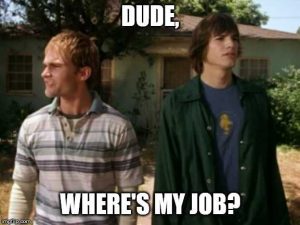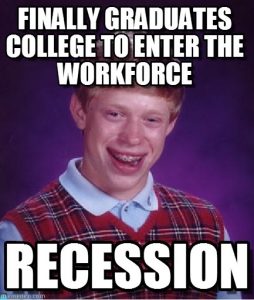It’s time to move past simple advantages/disadvantages and think about what will best prepare you for situations you may face after college. Although we can’t predict the future, we can use a technique called scenario planning to get insight into what factors might be important. To paraphrase the Wikipedia entry, scenario planning is a strategic planning method used to make flexible long-term plans. In practice, we’re going to try to imagine some potential paths the future could take (“scenarios”), see which factors would matter most to us in each one, and then think about what we should be doing now to prepare for them (“planning”).*
I created two scenarios we’ll work through, and I gave them names and memes for fun. Here’s what they’ll look like:
- Shifting Sands: For the next decade, the job market changes more and more rapidly because of an evolving global economy and the automation of jobs
- Recession 2.0: The recession of 2008 returns with a vengeance (different cause; same outcome)
Let’s discuss them one at a time.
Shifting Sands

Future Scenario
Although it wasn’t obvious back when you were settling on a college major, things look different now that a decade has passed by. As was commonly predicted, artificial intelligence steamrolled entire industries, leaving many people without jobs. Roles involving “routine, repetitive and predictable” work—such as insurance underwriters, tax preparers, and loan officers—disappeared faster than anyone had expected (source). The individuals employed in these professions were forced to retool to stay relevant in the changing economy. Some of them were able to build new skills and escape to other professions; others felt like they were left behind, squeezed out of the middle-class, and forced into low-wage jobs.
Other workers fared better. Jobs that relied on social intelligence, creativity, and perception/manipulation—such as elementary teachers, dieticians, and surgeons—proved to be highly resilient to automation (PDF, page 27). Most of the people in these roles were able to maintain their career trajectories without worry, although some of them found their jobs outsourced to countries with lower-paid-and-equally-educated workers. Even for the jobs that did remain viable, many workers found their skillsets were no longer a match for what employers wanted. With so much change occurring, job experience was seen as less important than the ability to learn quickly. In the long-term, few jobs seemed to be a safe bet, and the winners were those who happened to pick a resilient career and those who were able to adapt on the fly.
Analysis
In a Shifting Sands world, some approaches to college look better than others. Career prep could be a winner or a loser, depending on how the job market treats your target profession. If you select a career path wisely and fortune favors your choice, you could end up weathering the storm from a calm cove. If your chosen profession ends up on the decline, however, the narrow focus of your preparations could make it tough to shift to a new career. In contrast, the self-improvement path can provide a set of broad skills and experiences that improve your ability to move in the direction of the greenest grass. The gains may come at the expense of long-term job security, though, which means you shouldn’t expect the type of stable career that was standard in your grandparents’ days. In such a world, self-improvement may offer greater adaptability and less chance of being locked into a dying career path, but neither approach can offer any guarantees.
Recession 2.0

Future Scenario
The recession hit right as you were starting to apply for your first real job after graduating. Companies providing essential goods and services were able to survive by tightening their belts. Other companies, such as those producing luxury goods aimed at the middle-class, did not fare nearly as well: Some of them went out of business immediately, and others only survived because they implemented hiring freezes and laid off non-essential staff. For companies that did survive, the focus was on maintaining business-as-usual without taking unnecessary risks. That meant they prioritized “safe” job candidates with credentials and proven track-records. And those candidates were widely available at discounted rates, since many people found themselves desperate with no way to pay their bills after being laid off.
During this time, not many people voluntarily chose to leave their jobs. While greener pastures may have looked appealing to some of them, the risk of ending up jobless was too great to bear. The same was true for workers approaching retirement: Why give up a paying job to retire at a time when the future was looking so bleak?
All of this added up to a heaping dose of bad news for recent grads.
Analysis
If you graduate into a recession, you’ll find it difficult to get a decent career started. This is a particularly big risk for those pursuing self-improvement in college, since their long-term investment provides no job security in the short-term. The career prep path can be a mixed bag, depending on how your target industry tends to fare during recessions. For example, the healthcare industry is generally more resilient to economic downturn than, say, the construction industry. For many students graduating into a recession, the best choice may seem to be to return to school for an advanced degree and try to wait out the recession.
There’s one other factor that will affect how well you can handle a recession: financial stability. Graduates with substantial financial obligations (such as student loans) will be at the greatest risk of getting knocked off-track. The need to pay back loans or support a family can decrease your flexibility to return to school or to wait out the storm.
In such a world, the riskiest propositions are (i) focusing exclusively on job preparation in a fragile field and (ii) having pressing financial commitments beyond your capacity to support.
Conclusion
Our scenarios identified some serious concerns: The career prep path could leave you in a bad situation if the job is automated right out from under you or if the industry takes a hit during a recession. Similarly, self-improvement may not look like it was such a great choice if a recession causes employers to take fewer chances on unproven workers or if you have trouble finding a job that will allow you to pay back your student loans.
Next up, let’s move past scenarios and talk about the final few factors that may influence your approach to college.
*If you’d like to learn more about the form of scenario planning we’re using here, see Peter Schwartz’s 1991 book, The Art of the Long View. (return to section)